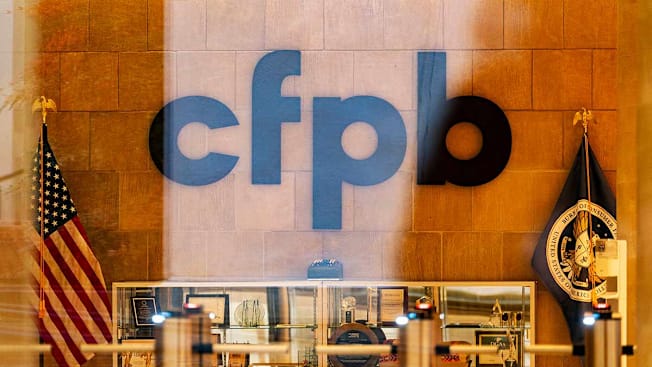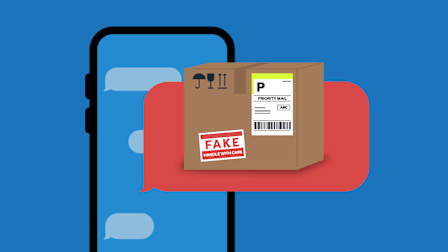The Consumer Financial Protection Bureau Is Being Told to Stop Its Work. 5 Ways That Could Impact Consumers Like You.
In its 14 years, the CFPB has created rules limiting credit card late fees and overdraft penalties, protected consumers from unfair lending practices, and much more. Here’s what might happen next.

The Consumer Financial Protection Bureau—the small federal agency with a big mission to help consumers navigate the financial marketplace—could effectively be shutting down for the next four years. The prospect imperils consumers across the country, advocates and experts from Consumer Reports and elsewhere say.
Rohit Chopra, the CFPB’s director since 2021, was fired over the weekend. In an email sent on Monday, Treasury Secretary Scott Bessent was named the CFPB’s acting director and told the agency’s 1,600 employees to halt any activity related to enforcement, litigation, and public communication, and to suspend all rulemaking.
Stop the Attack on Consumer Financial Protections
Send a message now to your members of Congress asking them to stand up for consumers, not big banks.
Limiting Credit Card Late Fees and Overdraft Fees
In 2024, the CFPB had finalized rules that would limit overdraft charges and credit card late fees, saving U.S. consumers about $15 billion a year.
The overdraft rule capped those fees at $5, or whatever actual costs the bank incurs for the overdraft. That’s compared with a current industry average overdraft fee of $35. For families who pay them, overdraft fees add up to an average of $225 per household each year, and are particularly onerous for families already struggling with inflation and high prices, says Christine Chen Zinner, senior policy counsel at Americans for Financial Reform.
Similarly, the rule on capping credit card late fees would limit those fees to $8 per month, compared with the current average of $30 for a first late payment and $41 for each subsequent late payment.
The CFPB’s rules on overdraft and late fees are crucial protections for families already struggling with rising costs," says Chuck Bell, programs director for advocacy at Consumer Reports. "Without these guardrails, banks can continue to pile on excessive fees that disproportionately impact low- and moderate-income households."
But now Congress is considering overturning the limit on overdraft fees using the Congressional Review Act, which allows them to reverse any federal agency rule enacted in the previous six months by a simple majority vote.
The credit card late fee rule, passed more than six months ago in March 2024, was being challenged in court by two Texas banking industry groups and the U.S. Chamber of Commerce. A federal judge is still hearing that case, but it appears unlikely the CFPB—in whatever future form it takes—would pursue the case if it’s ultimately ruled in favor of the banks.
Banning the Use of Medical Debt on Credit Reports
After years of work, the CFPB published a rule in January prohibiting unpaid medical debt from appearing on consumers’ credit reports, a protection meant to prevent harm to an individual’s credit because they had the misfortune of getting sick.
In response to CFPB efforts, in 2022, the big three U.S. credit reporting agencies—Equifax, Experian, and TransUnion—had removed some, but not all, data about medical collections from its credit reports. But the CFPB has since found that about 15 million Americans were still impacted by medical debt reporting, and that when it shows up on credit reports, it reduces peoples’ credit scores by an average of 20 points. Those most impacted: people living in the South and in predominantly Black and Hispanic neighborhoods, according to the National Consumer Law Center. An estimated 22,000 new mortgages would likely be approved each year if the rule was enacted, the CFPB has said.
The three credit bureaus are pushing for the medical debt rule to be withdrawn entirely, arguing that the CFPB “lacks the legal authority to prohibit creditors from considering medical debt, as long as information about the provider of medical services or the nature of services provided is not disclosed,” Dan Smith, president and CEO of the Consumer Data Industry Association, said in a statement. Hospitals and their collection companies have also pushed back on the rule, saying that if the rule was finalized, it would incentivize consumers not to pay their medical bills.
When CFPB rules are struck down, as the medical debt rule may be, states can pass their own similar consumer protection laws. In 2024, several states, relying on guidance from the CFPB, passed their own legislation that limits medical debt on credit reports. They include California, Colorado, and New York. And in mid-January, just a few days before the Trump administration took office, the CFPB published a how-to guide for states to “ensure their laws and regulations meet new consumer protection challenges.”
“We fully expect states to step up and advocate for things like medical debt and other consumer issues,” says Beverly Brown Ruggia, the financial justice organizer for New Jersey Citizen Action, which advocates for regulatory reforms and policies in that state. “We won’t be going away.”
Stopping Data Brokers From Selling Your Personal Info
There are thousands of data brokers in the U.S.: companies that scoop up info about Americans’ online activity, shopping habits, and personal finances and then sell the information to clients. Often, data brokers take a mix of purchased and publicly available data about you and repackage it into detailed reports that they sell to marketing and advertising firms, creditors, insurers, and even employers and landlords.
In December 2024, the CFPB proposed a rule that would regulate data brokers under the federal Fair Credit Reporting Act, the landmark 1970 law that protects the use and limits the type of personal info that can be sold for a few select “permissible uses.”
If the data broker rule were enacted, those companies could sell financial and personal info—including names, addresses, dates of birth, Social Security numbers, and phone numbers—for a handful of reasons, such as evaluating an application for new credit, insurance, or employment. It would also require that personal info contained in data broker reports be accurate and accessible to consumers to review.
The CFPB rule, if enacted, would also minimize the risks to consumers if their sensitive data is not properly protected by data brokers. Those risks include a foreign adversary, like China and Russia, buying info on military service members, veterans, and government employees. Cybercriminals buy financial profiles of potential victims and use them to target those who are wealthy, older, and vulnerable. And law enforcement agencies are concerned about data brokers selling data to those who want to stalk, harass, or harm other people.
The data broker rule was never finalized, and it is unlikely to be revitalized by the Trump administration.
While federal regulation remains uncertain, some states have moved to restrict data brokers. Vermont requires data brokers to register with the state and maintain security standards, while California’s privacy law gives residents the right to opt out of data sales. Maine prohibits internet service providers from selling customers’ personal information without consent.
Still, digital privacy is an issue that “both Democrats and Republicans agree on and, even if this particular rule doesn’t survive, I could see some bipartisan work being done,” says Alan Kaplinsky, who leads the consumer financial services practice at the law firm Ballard Spahr.
Regulating Payday Cash Advance Apps and Buy Now, Pay Later Products
Much of the CFPB’s post-pandemic work had focused on figuring out ways to supervise and regulate emerging financial technology companies. That’s because there has been an explosion of new tech products—from peer-to-peer payment apps like Zelle and Venmo to digital wallets, which store credit and debit card info on your phone so that you can pay for things by waving your device at a card reader at checkout.
But those apps carry security risks and the potential for losing huge sums of money to an increasing number of cybercriminals operating in the U.S. and overseas. "Our research shows that consumers are increasingly using digital payment services and financial apps, but these products often lack basic protections against fraud and unauthorized charges,” says CR’s Bell.
The CFPB has proposed what it calls “interpretative rules” for both buy now, pay later loans and paycheck cash advance apps, sometimes called “Earned Wage Access,” which let users take money from their paycheck a few days early. The BNPL loan rule would allow customers to dispute charges and get refunds from a lender after returning a purchased product. The paycheck cash advance rule would define the advances as “loans” under the federal Truth in Lending Act and, as a result, would require the companies offering them to disclose all of their fees and interest rates to consumers.
This type of guidance is meant to help regulators decide how the industry should be regulated, but it is not an enforceable rule. “The CFPB’s work establishing clear rules for these services is crucial—without it, consumers could lose millions to scams with little recourse for getting their money back or be overcharged for borrowing," says Bell.
The CFPB’s interpretative rules regarding earned wage access apps will likely be dismissed by the new administration as companies have waged a nationwide lobbying effort to avoid having their products defined as “loans.” The American Fintech Council, a trade association representing several payday cash advance companies, have supported the change in regulatory oversight, calling the CFPB’s previous attempts to regulate its members "irresponsible and deficient."
Penalizing Companies for Taking Advantage of Consumers
Four major enforcement actions by the CFPB in their early stages are on the line, with billions of dollars in money for both consumers and the U.S. government at stake.
In mid-January 2025, the CFPB filed a federal lawsuit in Virginia against Capital One, alleging the bank cheated its customers out of an estimated $2 billion, by misleading them about the interest rates they would receive in their savings accounts. In its complaint, the agency said Capital One had frozen a popular savings account interest rate at 0.30 percent, from December 2020 until at least August 2024, even as savings account interest rates across the country rose far higher. The bank also allegedly coached its employees to avoid offering a similar savings account at the bank with a much higher interest rate.
Three of the nation’s largest banks that collectively own Zelle—JP Morgan, Wells Fargo, and Bank of America—are also being sued by the CFPB for allegedly letting cyber fraud run rampant on the platform, with losses estimated at nearly $1 billion. Walmart and a smaller financial technology company, Branch Messenger, are accused of illegally opening more than 1 million bank accounts for delivery drivers and charging them more than $10 million in junk fees. And another popular payments app, Cash App, was ordered in January to pay $120 million back to consumers, along with a $55 million civil penalty, for what the CFPB called “weak security protocols” and conditions ripe “for fraud to proliferite.”
Zelle has called the CFPB’s lawsuit “legally and factually flawed" and said its payments platform heavily polices potential fraud and scams. It also accused the agency of being politically driven.
Sen. Elizabeth Warren (D-Mass.), who conceived of a bureau like the CFPB when she was a professor at Harvard Law School, warned that shutting down the agency while it is “on the verge of delivering money into the pockets of working people is at odds with President Trump’s claim that he wants to lower costs for families.”
If the CFPB stops enforcing consumer laws, financial institutions could feel emboldened to skirt existing rules.
"The bureau was created during the Great Recession to prevent the mistakes that happened with subprime mortgages to happen again," says Jeff Sovern, a professor and expert in consumer financial law at the University of Maryland Law School. "We might see companies violating these laws again and getting away with it—and who is going to stop them?"
Editor’s Note: Our work on privacy, security, AI, and financial technology issues is made possible by the vision and support of the Ford Foundation, Omidyar Network, Craig Newmark Philanthropies, and the Alfred P. Sloan Foundation.




















